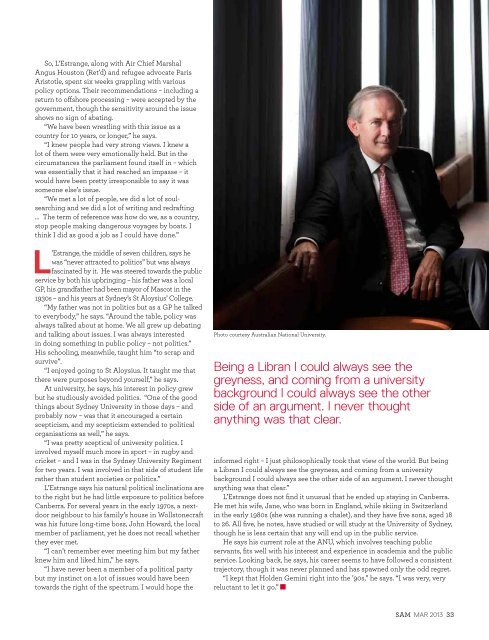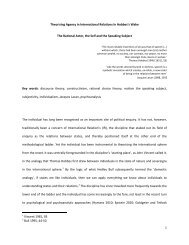Download PDF - The University of Sydney
Download PDF - The University of Sydney
Download PDF - The University of Sydney
You also want an ePaper? Increase the reach of your titles
YUMPU automatically turns print PDFs into web optimized ePapers that Google loves.
So, L’Estrange, along with Air Chief Marshal<br />
Angus Houston (Ret’d) and refugee advocate Paris<br />
Aristotle, spent six weeks grappling with various<br />
policy options. <strong>The</strong>ir recommendations – including a<br />
return to <strong>of</strong>fshore processing – were accepted by the<br />
government, though the sensitivity around the issue<br />
shows no sign <strong>of</strong> abating.<br />
“We have been wrestling with this issue as a<br />
country for 10 years, or longer,” he says.<br />
“I knew people had very strong views. I knew a<br />
lot <strong>of</strong> them were very emotionally held. But in the<br />
circumstances the parliament found itself in – which<br />
was essentially that it had reached an impasse – it<br />
would have been pretty irresponsible to say it was<br />
someone else’s issue.<br />
“We met a lot <strong>of</strong> people, we did a lot <strong>of</strong> soulsearching<br />
and we did a lot <strong>of</strong> writing and redrafting<br />
… <strong>The</strong> term <strong>of</strong> reference was how do we, as a country,<br />
stop people making dangerous voyages by boats. I<br />
think I did as good a job as I could have done.”<br />
L’Estrange, the middle <strong>of</strong> seven children, says he<br />
was “never attracted to politics” but was always<br />
fascinated by it. He was steered towards the public<br />
service by both his upbringing – his father was a local<br />
GP, his grandfather had been mayor <strong>of</strong> Mascot in the<br />
1930s – and his years at <strong>Sydney</strong>’s St Aloysius’ College.<br />
“My father was not in politics but as a GP he talked<br />
to everybody,” he says. “Around the table, policy was<br />
always talked about at home. We all grew up debating<br />
and talking about issues. I was always interested<br />
in doing something in public policy – not politics.”<br />
His schooling, meanwhile, taught him “to scrap and<br />
survive”.<br />
“I enjoyed going to St Aloysius. It taught me that<br />
there were purposes beyond yourself,” he says.<br />
At university, he says, his interest in policy grew<br />
but he studiously avoided politics. “One <strong>of</strong> the good<br />
things about <strong>Sydney</strong> <strong>University</strong> in those days – and<br />
probably now – was that it encouraged a certain<br />
scepticism, and my scepticism extended to political<br />
organisations as well,” he says.<br />
“I was pretty sceptical <strong>of</strong> university politics. I<br />
involved myself much more in sport – in rugby and<br />
cricket – and I was in the <strong>Sydney</strong> <strong>University</strong> Regiment<br />
for two years. I was involved in that side <strong>of</strong> student life<br />
rather than student societies or politics.”<br />
L’Estrange says his natural political inclinations are<br />
to the right but he had little exposure to politics before<br />
Canberra. For several years in the early 1970s, a nextdoor<br />
neighbour to his family’s house in Wollstonecraft<br />
was his future long-time boss, John Howard, the local<br />
member <strong>of</strong> parliament, yet he does not recall whether<br />
they ever met.<br />
“I can’t remember ever meeting him but my father<br />
knew him and liked him,” he says.<br />
“I have never been a member <strong>of</strong> a political party<br />
but my instinct on a lot <strong>of</strong> issues would have been<br />
towards the right <strong>of</strong> the spectrum. I would hope the<br />
Photo courtesy Australian National <strong>University</strong>.<br />
Being a Libran I could always see the<br />
greyness, and coming from a university<br />
background I could always see the other<br />
side <strong>of</strong> an argument. I never thought<br />
anything was that clear.<br />
informed right – I just philosophically took that view <strong>of</strong> the world. But being<br />
a Libran I could always see the greyness, and coming from a university<br />
background I could always see the other side <strong>of</strong> an argument. I never thought<br />
anything was that clear.”<br />
L’Estrange does not find it unusual that he ended up staying in Canberra.<br />
He met his wife, Jane, who was born in England, while skiing in Switzerland<br />
in the early 1980s (she was running a chalet), and they have five sons, aged 18<br />
to 26. All five, he notes, have studied or will study at the <strong>University</strong> <strong>of</strong> <strong>Sydney</strong>,<br />
though he is less certain that any will end up in the public service.<br />
He says his current role at the ANU, which involves teaching public<br />
servants, fits well with his interest and experience in academia and the public<br />
service. Looking back, he says, his career seems to have followed a consistent<br />
trajectory, though it was never planned and has spawned only the odd regret.<br />
“I kept that Holden Gemini right into the ’90s,” he says. “I was very, very<br />
reluctant to let it go.”<br />
SAM mar 2013 33
















